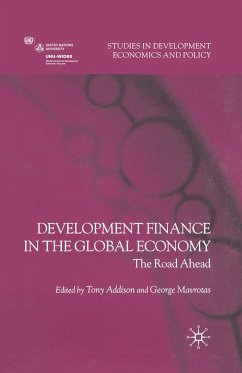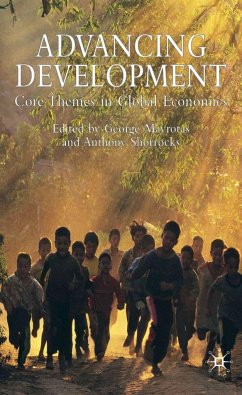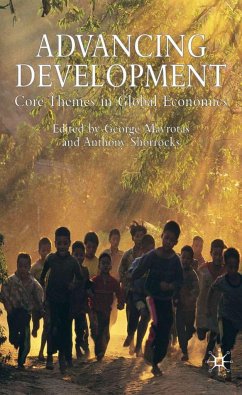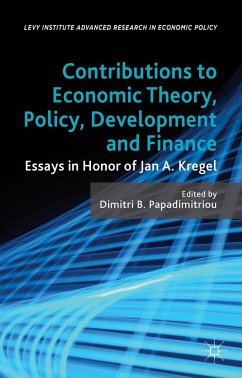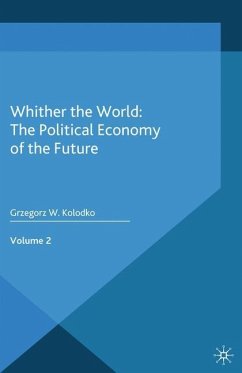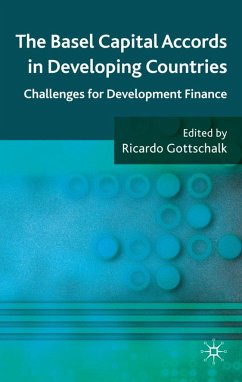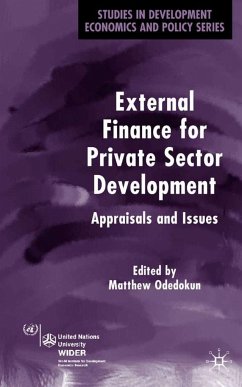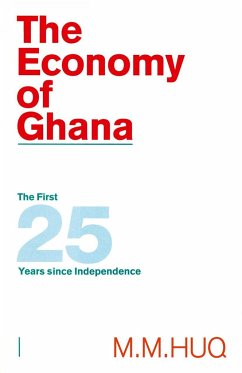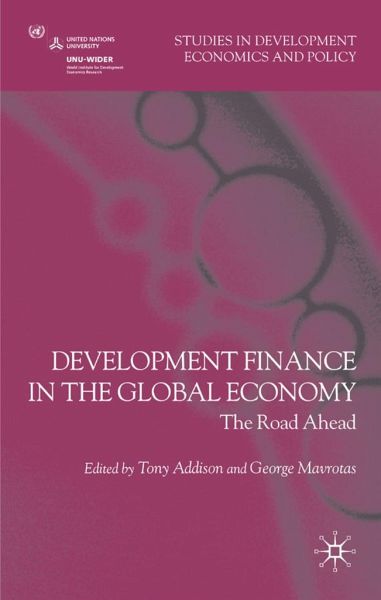
Tony Addison / G. Mavrotas
Gebundenes Buch
Development Finance in the Global Economy
The Road Ahead
Herausgegeben: Addison, Tony; Mavrotas, George
Versandkostenfrei!
Versandfertig in 6-10 Tagen
Weitere Ausgaben:

PAYBACK Punkte
38 °P sammeln!





A positive chapter has begun in finance for poor countries. Yet progress remains tentative. This book looks at how to make international finance better serve the needs of poor countries and poor people. It contains contributions by economists and political scientists who have been at the centre of the international policy debate.
PETER BURNELL Professor of Politics, Department of Politics and International Studies, University of Warwick, UK ANTHONY CLUNIES-ROSS Retired Economist, University of Strathclyde, UK SIMON FEENY Postdoctoral research fellow, RMIT University, Melbourne, Australia JEREMY HEIMANS Research Associate, Global Economic Governance Programme, University of Oxford, UK RENU KOHLI Senior Economist, International Monetary Fund, New Delhi, India JOHN LANGMORE Professorial Fellow, University of Melbourne, Australia ROBERT LENSINK Professor in Finance and Financial Markets, University of Groningen, The Netherlands MARK MCGILLIVRAY Deputy Director, UNU-WIDER; Honorary Professor of Development Economics, University of Glasgow, UK; External Fellow, Centre for Economic Development and International Trade, University of Nottingham, UK; Inaugural Fellow, Human Development and Capability Association STEVEN RADELET Senior Fellow, Centre for Global Development, Washington, USA HELMUT REISEN Councillor, OECD Development Centre, Paris, France; Professor of Economics, Basel University, Switzerland MARCELO SOTO Researcher, Instituto de Análisis Económico, Barcelona HELEN TOXOPEUS Analyst, ABN AMRO Bank THOMAS WEITHÖNER Counsellor for Cultural Affairs, German Embassy, Bucharest HOWARD WHITE Independent Evaluation Group, World Bank
Produktdetails
- Studies in Development Economics and Policy
- Verlag: Palgrave Macmillan / Palgrave Macmillan UK / Springer Palgrave Macmillan
- Artikelnr. des Verlages: 978-0-230-20248-1
- 2008 edition
- Seitenzahl: 294
- Erscheinungstermin: 17. April 2008
- Englisch
- Abmessung: 215mm x 149mm x 22mm
- Gewicht: 514g
- ISBN-13: 9780230202481
- ISBN-10: 0230202489
- Artikelnr.: 23301545
Herstellerkennzeichnung
Libri GmbH
Europaallee 1
36244 Bad Hersfeld
gpsr@libri.de
The publication of this book on development finance is most timely, and should contribute to the major international conferences in 2008 considering financing for development issues. It significantly advances new thinking, especially on aid and new sources of development finance.
Jomo Kwame Sundaram, UN Assistant Secretary General for Economic Development
Since the UN Monterrey conference in March 2002, the international structure of financing for development has changed profoundly. This volume, which extends UNU-WIDER's work in this field, provides a timely update and analysis of the developments in key areas of development financing foreign direct investment, debt, financing from the Bretton Woods institutions, official
Jomo Kwame Sundaram, UN Assistant Secretary General for Economic Development
Since the UN Monterrey conference in March 2002, the international structure of financing for development has changed profoundly. This volume, which extends UNU-WIDER's work in this field, provides a timely update and analysis of the developments in key areas of development financing foreign direct investment, debt, financing from the Bretton Woods institutions, official
Mehr anzeigen
development assistance, and the so-called innovative sources of international financing.
Manuel F. Montes, Chief, Policy Analysis and Development, Financing for Development Office, UNDESA
Comprising outstanding contributionsby well-known economists, this book takes the debate on development finance a step further: the focus is on emerging issues in aid delivery and effectiveness multilateral aid vis-à-vis bilateral aid, the contribution of aid in the provision of international public goods, the role of Multi-actor Global Funds, and the impact of recently introduced Millennium Challenge Account by the USA. The book does an excellent job of presenting a balanced and appropriately nuanced assessment of these issues andcomplements other volumes on new sources development finance.
Sanjeev Gupta, Senior Advisor, Fiscal Affairs Department, IMF
An excellent account of the current state of affairs in development finance.
Yilmaz Akyüz, Former Director, Division on Globalization and Development Strategies, UNCTAD
This interesting, balanced and well-argued new book is a timely reminder of the risks and challenges of current financial arrangements. Abundant liquidity, cheap credit and high commodity prices may not last forever. The current reality of a high concentration of private financing in a handful of emerging economies and the often cumbersome process of foreign aid to low-income nations is far from optimal. The book reviews alternatives, discusses new financial schemes to support development and warns against unwarranted financial optimism. Highly recommended.
Andrés Solimano, Regional Advisor, UN-ECLAC, and editor of The International Mobility of Talent
Manuel F. Montes, Chief, Policy Analysis and Development, Financing for Development Office, UNDESA
Comprising outstanding contributionsby well-known economists, this book takes the debate on development finance a step further: the focus is on emerging issues in aid delivery and effectiveness multilateral aid vis-à-vis bilateral aid, the contribution of aid in the provision of international public goods, the role of Multi-actor Global Funds, and the impact of recently introduced Millennium Challenge Account by the USA. The book does an excellent job of presenting a balanced and appropriately nuanced assessment of these issues andcomplements other volumes on new sources development finance.
Sanjeev Gupta, Senior Advisor, Fiscal Affairs Department, IMF
An excellent account of the current state of affairs in development finance.
Yilmaz Akyüz, Former Director, Division on Globalization and Development Strategies, UNCTAD
This interesting, balanced and well-argued new book is a timely reminder of the risks and challenges of current financial arrangements. Abundant liquidity, cheap credit and high commodity prices may not last forever. The current reality of a high concentration of private financing in a handful of emerging economies and the often cumbersome process of foreign aid to low-income nations is far from optimal. The book reviews alternatives, discusses new financial schemes to support development and warns against unwarranted financial optimism. Highly recommended.
Andrés Solimano, Regional Advisor, UN-ECLAC, and editor of The International Mobility of Talent
Schließen
Für dieses Produkt wurde noch keine Bewertung abgegeben. Wir würden uns sehr freuen, wenn du die erste Bewertung schreibst!
Eine Bewertung schreiben
Eine Bewertung schreiben
Andere Kunden interessierten sich für




